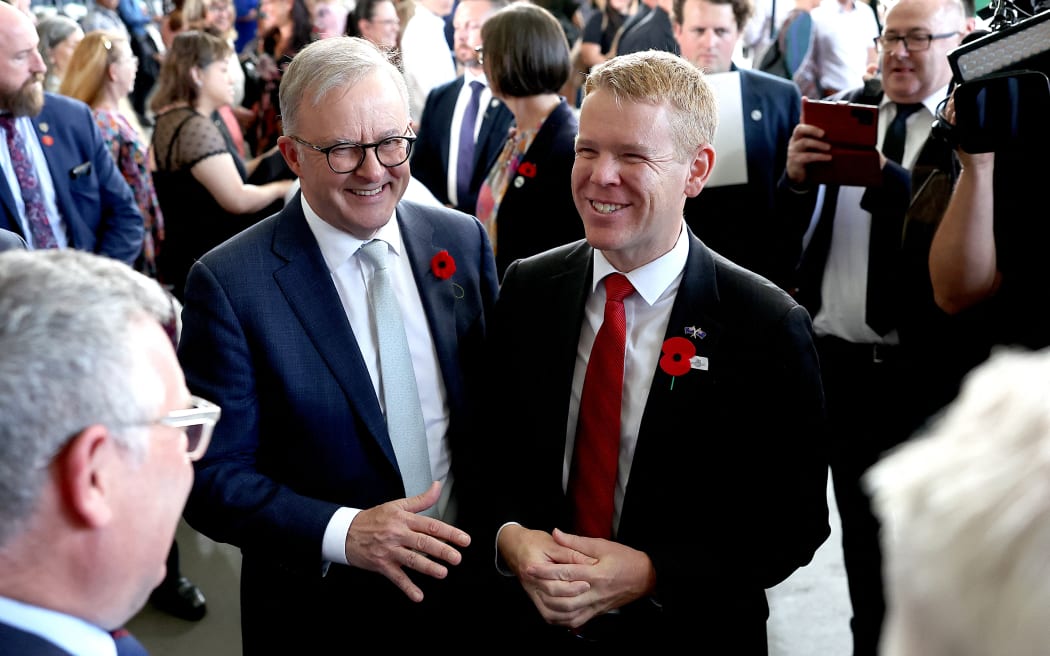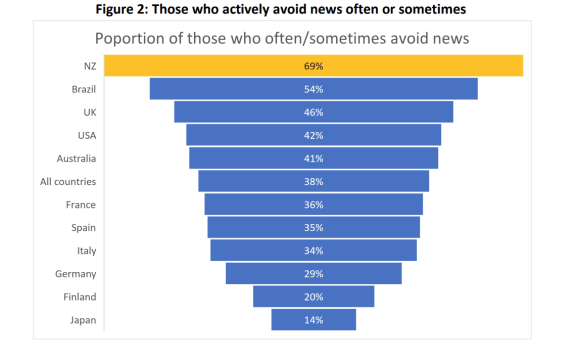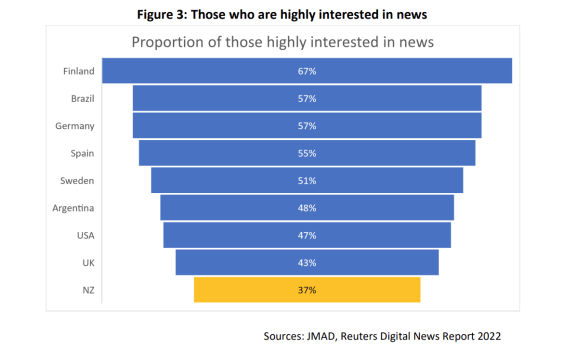
Australian Prime Minister Anthony Albanese and New Zealand Prime Minister Chris Hipkins chat after a Citizenship ceremony in Brisbane. Photo: AFP / Pat Hoelscher
For 22 years, media stories regularly bemoaned Kiwis treated as second class citizens across the ditch. This week, the problem finally got resolved, only for coverage to turn to fears of a 'Great Exodus' within hours.
In November last year 1News correspondent Andrew MacFarlane asked Australian home affairs minister Clare O’Neill why her government was treating New Zealanders as "second-class citizens".
"That's a really good question and that's something that's been bothering me for a long time," she said.
Her frank concession came after years of reports about the perilous legal status of New Zealanders living long-term across the ditch.
They have been denied disability payments, jobseeker support and student loan services in Australia since the introduction of a 2001 law limiting their pathways to citizenship.
That has resulted in hardship and complaints about unequal treatment.
Back in 2011, Kiwis living in Australia were denied government assistance after being caught up in the Queensland floods.
A Stuff story at the time picked up on the plight of Jayde Fuli, who was facing financial ruin due to a lack of assistance from the Australian government.
In 2014, Stuff reported on a sick toddler who was denied healthcare in Australia because his parents were Kiwis, despite him having never set foot in New Zealand.
It also published an investigation on what it called discrimination across the ditch in 2018, highlighting the case of a woman who fell into depression and drug addiction after being unable to access support following the death of her child.
This coverage has been matched in other media, which have consistently called out the Australian government for collecting New Zealanders’ taxes but failing to offer them the same rights as other citizens.
Given that, prime minister Chris Hipkins was probably expecting a glowing reception and a run of good press when he stepped up to a media scrum last weekend to announce a new citizenship pathway for Kiwis living in the lucky country.
"It is a very significant day for the trans-Tasman relationship, a very positive day for the relationship between New Zealand and Australia," he said.
There was some positive coverage for the move on the front pages of the Weekend Herald, The Press and The Dominion Post.
But as it turns out, putting an end to a 22-year problem only wins you about six hours of good headlines.
By early Saturday afternoon, a less celebratory angle was starting to cut through on the websites of our major news organisations.
Both the Herald and Stuff ran stories about a potential "exodus" of New Zealand workers to Australia following the citizenship change.
Those worries amped up the following day.
The Sunday Star-Times carried two profiles of New Zealanders packing their bags and moving across the ditch.
Its editor Tracy Watkins accompanied those with a stinging editorial about the “big fish hook” in the Australia citizenship deal, which ended: "Will the last one to leave please turn off the lights?".
On Wednesday TVNZ’s Seven Sharp joined the chorus warning that Australia is stealing our workers, just like they did with our best horse and our sweet treats.
"We're used to Australia taking things from us: Phar Lapp, pav, Crowded House, and don't forget lamingtons," said presenter Jeremy Wells.
"Well it turns out they're at it again: this time it's Aussie employers trying to poach hard-working Kiwis," added Hilary Barry.
That may have been a bit tongue in cheek, and Seven Sharp’s story delivered a useful comparison of the wages and conditions workers can expect in New Zealand and Australia.
In The New Zealand Herald commentator Richard Prebble was less constrained by facts, figures, or indeed reality, writing that New Zealand is “becoming a third-world country”, and Australia is only changing its citizenship rules to “strip this country of our best”.
The overarching theme of the coverage was that getting a better deal in Australia might leave some New Zealanders with little reason to stay here, and the rest of us worse off as a result.
There’s one small problem with that assertion: it doesn’t appear to have much – if any – real data underpinning it.
The economist Shamubeel Eaqub noted emigration to Australia peaked in 2013, and has since dropped off.
Infometrics chief executive Brad Olsen told AM a pathway to citizenship probably won’t be the biggest draw for New Zealanders thinking of heading across the Tasman.
"I don't know if it moves the dial considerably on Kiwis wanting to move over to Australia. There are already a lot of reasons why people have been considering doing so." he said.
At the least it’s too early to say whether there is – in Stuff’s words – a Great Exodus underway.
Other commentators criticised the negativity of the coverage.
The media isn’t a behemoth with a unified perspective, but politicians and news audiences could be tempted to feel like they’ve been the victim of a bait and switch after seeing 20 years of stories highlighting a pressing human rights issue, only to immediately see lines like about the government being "played like a didgeridoo" when it gets resolved.
At Newstalk ZB, afternoon host Heather du Plessis said she couldn't get behind the backlash.
"There are a bunch of commentators who are seeing negative in Australia's immigration announcement. I totally disagree with them. This is one of the most positive and significant changes for New Zealand in the ANZAC relationship. I don’t believe it’s going to lead to a significant brain drain. That brain drain’s already happening," she said.
In The Guardian, commentator and former Stuff political reporter Henry Cooke took aim at those trying to paint the deal as a bad thing, saying their arguments “do New Zealand a disservice”.
He said people should focus on making New Zealand better for workers, rather than making sure Australia is worse.
"The answer to this challenge shouldn’t be just trying to build the walls up higher or guilt Kiwis into staying. It should be making New Zealand as good a place to live as Australia with comparable (or better) incomes and working conditions," he wrote.
Cooke noted that Australia consistently pays out a higher proportion of its GDP in wages.

Figures produced by AUT's 2023 survey on trust in media. Photo: AUT
But analysis of why that is – and how to put New Zealand on par – has been limited, and the media bemoaning the trans-Tasman wage discrepancy might have done more to look at what’s actually behind it.
For instance, Australia has better productivity than New Zealand’s, lower taxes on low and middle income workers, a higher minimum wage, and a longstanding Modern Awards System similar to the Fair Pay Agreements legislation recently introduced here.
A deep dive into those topics might have been more useful than articles on whether we got played by making sure sick and otherwise out-of-luck New Zealanders can access support from the Australian government.
Maybe the quick turn toward pessimism was predictable.
Negativity bias in the news is an extensively studied phenomenon.
It’s pervasive, and not only in stories on Australian citizenship. For instance, this story isn’t focusing on the hundreds of worthy and informative stories published by the New Zealand media this week, and is instead honing in on a criticism of some coverage.

Photo:
Even if – in the words of one 2001 review paper – “bad is stronger than good”, that bias comes at a cost.
A recent trust in media survey by AUT produced a startling finding: New Zealanders are world-leaders in tuning out the news, with 69 percent of respondents saying they actively avoid it at least some of the time, and just 37 percent of us taking high interest in what’s being reported.
When asked why they were switching off, a common response was that the coverage is depressing and divisive.
The potential for an increase in people moving to Australia is a worthy topic to cover.
New Zealand does have a skills shortage, and workers leaving for greener pastures is a genuine concern.
But this week’s coverage could feel like a little bit of a slap in the face to the New Zealanders who’ve spent more than 20 years living as – in the media’s own words – second class citizens.
Perhaps our news organisations could do a little better at reporting and contextualising how their lives have improved in real terms, rather than just fretting over as-yet unrealised scenarios where their gain might be our loss.


